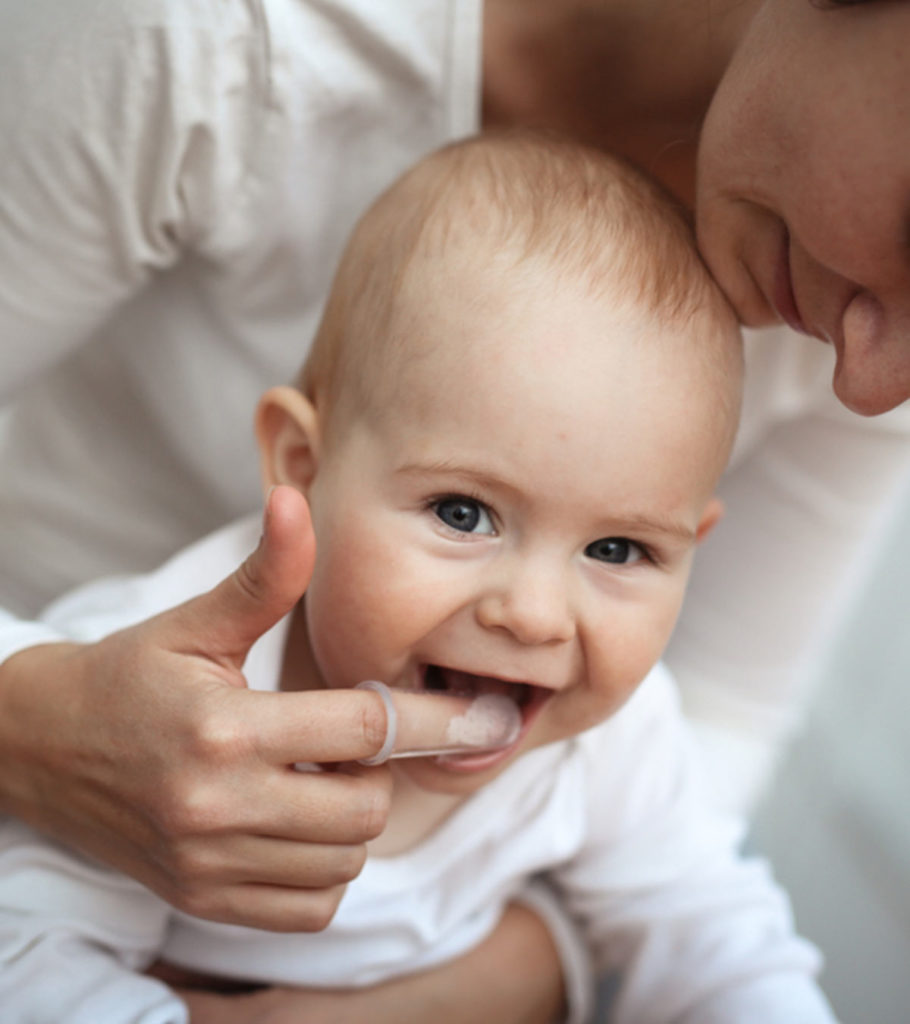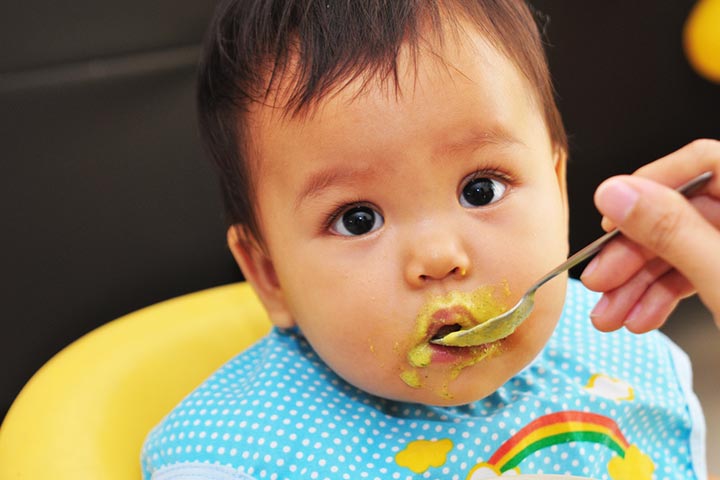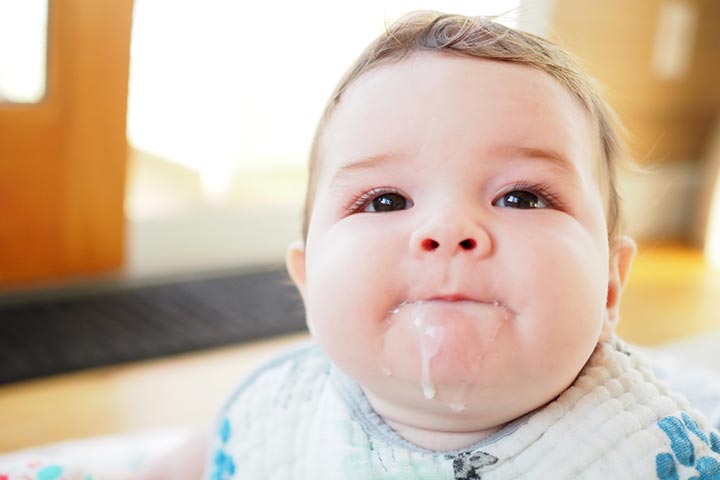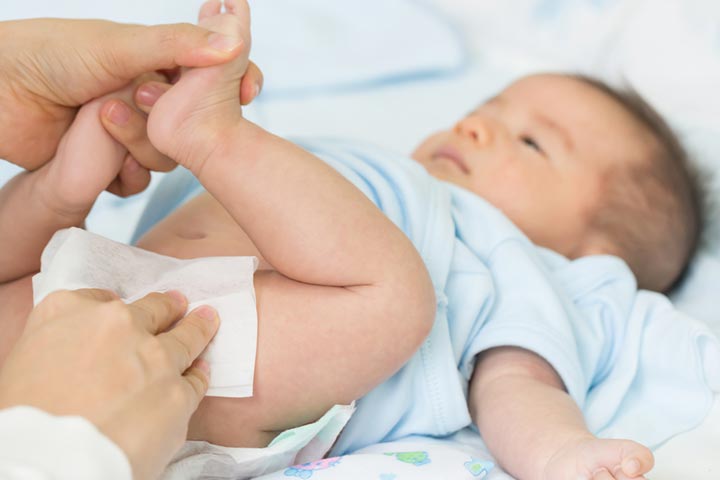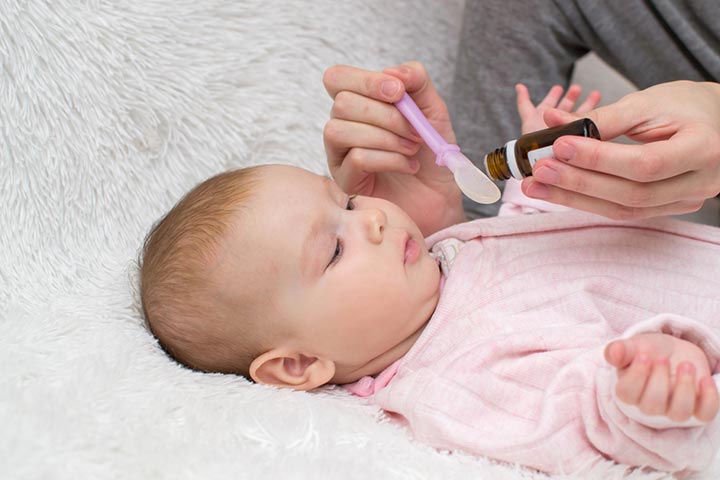Many parents seek pediatric care for teething and diarrhea during their baby’s teething period. Most babies begin teething when they initiate complementary feeding while weaning from breast milk and infant formula.
Although it can be exciting to see your little one getting their teeth, many babies experience discomforts such as gum pain, drooling rash, and sleep disturbances. In addition, some babies get diarrhea during teething.
So, does teething cause diarrhea? Read on to know more about the causes and treatment for teething and diarrhea and when to see a doctor.
Is There A Correlation Between Teething And Diarrhea?
Many parents often ask ‘can teething cause diarrhea?’ According to the American Academy of Pediatrics (AAP), teething does not cause diarrhea (1). Teething and diarrhea are often coincidental since infant teething usually begins around the same time when they start consuming solids. On average, babies may have their first tooth eruption (either of the two front teeth) by four to seven months of age (2). During this time, the transition of the baby from breast milk or formula to solids may lead to diarrhea as the baby’s sensitive digestive system adjusts to the dietary changes.
Also, around the age of six months, babies lose their maternal antibodies, making them vulnerable to infections, which may cause diarrhea. The watery stools or diarrhea in such cases can be a sign of severe infection (3) (4). All these simultaneous events could make the parents or caregivers assume that teething causes diarrhea.
What Are The Symptoms Of Teething And Diarrhea?
Babies display specific symptoms of teething and diarrhea, as elaborated below (3).
Symptoms of teething
- Biting and gnawing: Teething causes tender and sore gums that are often painful. A baby tries to self-soothe by biting and sucking. Parents and caregivers can try alleviating teething discomfort by gently massaging the sore gums with a clean finger or letting the baby chew on finger food, a teether, or a wet washcloth.
The teething process can cause discomfort and irritability in babies. Amber, a mother of three, shares her daughter’s experience managing the pain of emerging teeth. She says, “Still working on her two bottom teeth. She (her daughter) is busting them both at the same time- and sweet girl is working them with her mouth, tongue, lips, and anything she can get her hands on to stick in her mouth. You can see those teeth just barely under the gums. Won’t be long (i).”
- Cheek rubbing and ear pulling: Babies rub their cheeks and pull their ears due to the irritated gums. They usually do it when they are getting their molars.
If your baby has a fever and they are pulling their ears, it may be a sign of an ear infection and not merely teething.
- Drooling: Teething babies drool a little excessively to soothe their tender, inflamed gums. However, excessive drooling and trouble swallowing could indicate an underlying health concern (5). The baby may also develop a drooling rash since their delicate skin around the mouth stays constantly wet.
- Mild irritability: Inflammation and tearing of the gums during teething cause pain that can irritate a baby. This irritation could be accompanied by other symptoms, such as fussiness, disturbed sleep, and loss of appetite.
- Low-grade fever: Teething may increase the baby’s body temperature slightly. A low-grade fever has a temperature range of 98-100°F. A fever temperature of 100.4°F or higher could indicate an underlying problem.
Many of the teething signs and symptoms could also occur in other serious conditions or diseases. Consult a pediatrician to find out the precise cause.
Symptoms of diarrhea
A breastfed baby usually passes soft, lumpy stools that are light yellow. A formula-fed baby passes yellow to tan-colored stools similar in appearance to peanut butter (6). In healthy, growing babies, a greenish tinge to poop is normal, and the color may further vary if the baby eats solids.
Babies with diarrhea will have loose stools that may cause the diapers to leak. A baby may pass watery stools many times a day, depending on the underlying cause.
One or more of the following types of stools may indicate a underlying problem:
- Whitish or clay-like stools
- Stools with mucus or blood
- Large watery stools
- Frequent soiling
- Defecation immediately after each meal (after 6 months of age)
- Unusually foul smelling stools
- Fecal matter containing worms
- With associated problems like abdominal pain, excessive crying, fever, vomiting, poor appetite, redness around the anal region
There is no association between teething and diarrhea in babies. However, if your baby has diarrheal symptoms, especially viral diarrhea, it can last up to one to two weeks. It is vital to note that severe diarrhea lasts only one or two days. Therefore, you should contact a doctor if your baby shows symptoms beyond two weeks (7).
What Are The Possible Causes Of Diarrhea?
Diarrhea during teething may occur due to the following reasons.
- Viruses and bacteria: Viruses, such as rotavirus, and bacteria, such as salmonella, (which, according to a WHO report, is one of the four key global causes of diarrheal diseases), can cause infections that lead to diarrhea (8). These infections also cause other symptoms, such as fever and vomiting. Babies can get a viral or bacterial infection due to the ingestion of contaminated foods and drinks.
- Food intolerance or sensitivity: Changes in the breast milk composition due to maternal diet, change in formula, or the introduction of solids may cause diarrhea (9). Diarrhea may also occur due to food allergies, which can cause other symptoms, such as wheezing, coughing, and hives. Cow milk allergy and lactose intolerance are common causes of recurrent diarrhea in babies and toddlers.
- Medications: Some medicines, such as antibiotics, may irritate the gastrointestinal lining and cause loose, watery stools. Diarrhea usually resolves once the medication is stopped.
- Others: Several other conditions can also lead to diarrhea in babies. A few notable examples are parasitic infections, such as giardiasis, and gastrointestinal disorders, such as irritable bowel syndrome.
Some babies may have occasional diarrhea for no apparent reason. If the baby is healthy, eating well, and gaining weight, there is nothing to worry about. If the diarrhea is persistent and the baby has other symptoms, such as fever, consult a pediatrician to avoid complications, such as severe infection, dehydration etc.
How To Treat Diarrhea And Teething Pain In Infants?
The following are the treatment measures for teething and diarrhea, respectively.
- Treat diarrhea: The cure for diarrhea will depend on the treatment of the underlying cause. Consult a doctor once the baby develops diarrhea for early diagnosis and treatment of the problem. Healthcare providers recommend breastfeeding or formula feeding to a baby with diarrhea to prevent dehydration. You may also offer small amounts of water or oral rehydration solution after consulting a doctor. Again, natural probiotics like curd and buttermilk may help. Raw banana and rice-based diet may also help in controlling diarrhea.
- Relieving teething pain: Among the many teething remedies, offering finger foods, such as cooled cucumber sticks and breadsticks, is a healthy option. You can also gently massage your baby’s gums with a clean finger or a moist gauze pad occasionally. You can also give your baby teething rings for pain relief, provided the ring is made of firm rubber. Consult a pediatrician if you wish to use over-the-counter (OTC) medicines, or home remedies to alleviate teething pain (2).
The US Food and Drug Administration (US FDA) discourages the use of homeopathic medicines and teething jewelry to relieve teething pain since these products could be harmful (10).
When To Call A Doctor?
See a pediatrician urgently in the following situations (11).
- Baby is younger than six months and passing stools more frequently than usual
- Diarrhea is present for more than a day
- Blood in stools
- More than one spike of fever
- Repeated vomiting with or without trouble swallowing
- Loss of appetite and refusal to eat
- Lethargy, sunken soft spot, and fewer wet diapers could indicate severe dehydration
- Listless or irritable baby
- Excessive crying either continuously or intermittently
Teething and digestive issues are common reasons for a pediatric visit during the different stages of teething. Babies may often get diarrhea when they begin their solid diet, and they may lack maternal antibodies from breast milk around six months of age. Both these reasons contribute to diarrhea around the teething time, and it is often misunderstood as ṭo cause diarrhea. You may observe food intolerances and avoid ingredients that cause gastrointestinal issues, and treat diarrhea and teething pain if needed. Further, take necessary precautions to avoid dehydration due to water loss from the body.
Diarrhea often resolves on its own with home care especially in older babies (more than six months old). But if the character of the stool is as described above or if it is associated with any condition mentioned in the article or if the diarrhea for a long time, do not hesitate to see a doctor to determine the precise underlying cause and get appropriate advice.
Key Pointers
- Teething and diarrhea may occur simultaneously because the transition to solid foods occurs during teething.
- While diarrhea could be due to food insensitivity or microbial illnesses, teething is a part of the baby’s growth.
- Finger foods and gentle massages may help relieve pain due to teething, while doctors may treat diarrhea in infants based on the cause.
Does your baby have diarrhea without a fever? The following video may help you understand what’s happening and how to help my baby.
Recommended Articles
- Fisher Price Silicone Nibbler Reviews
